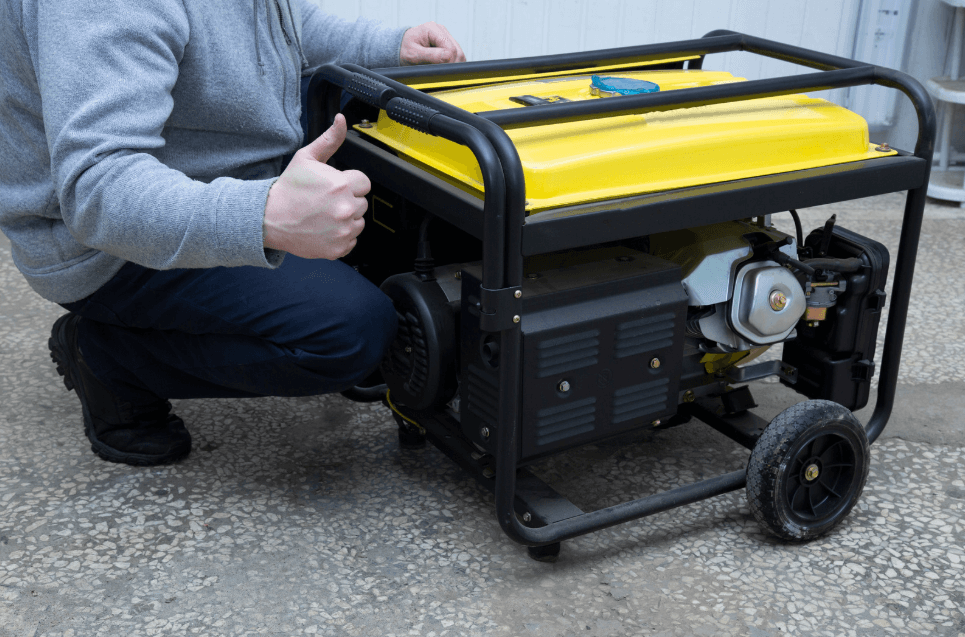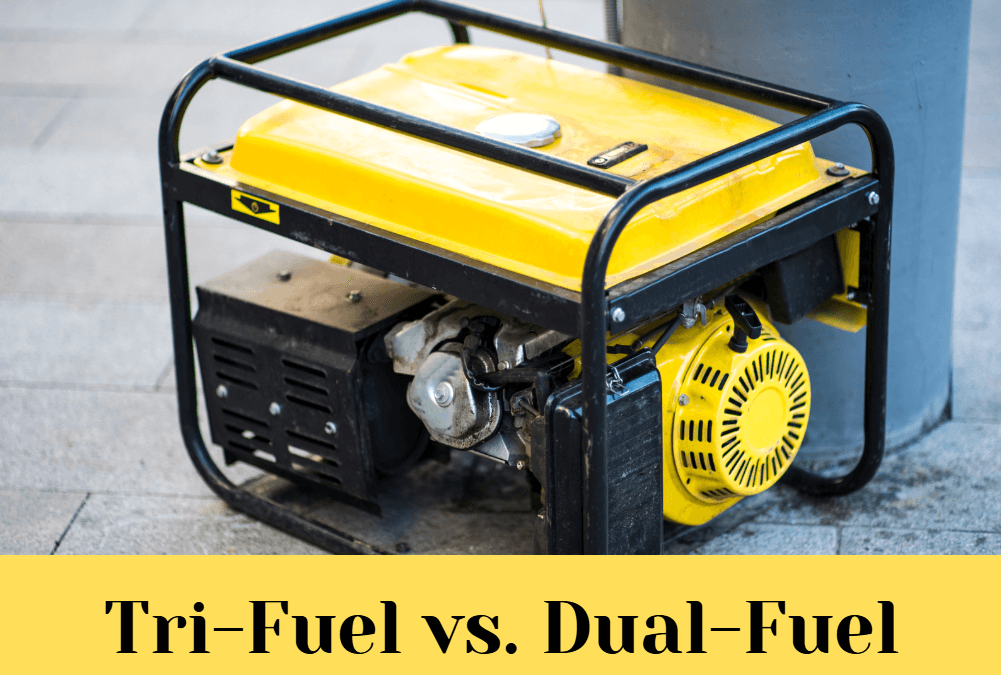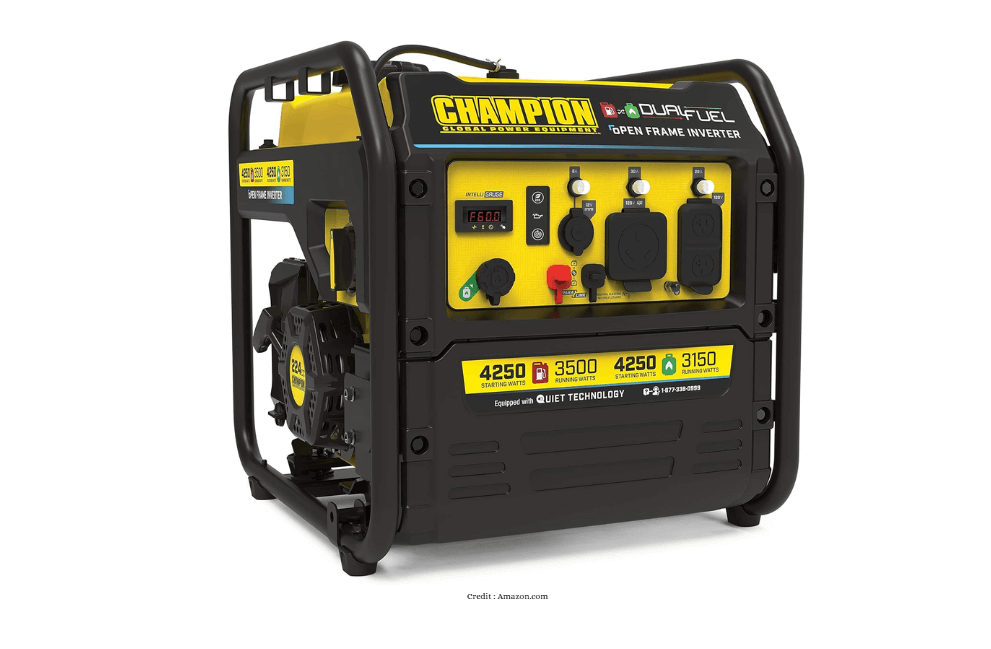
If you need reliable power during an emergency or on an outdoor adventure, a Champion Dual Fuel Generator is a lifesaver. These generators can run on both gasoline and propane, offering versatility and convenience that few generators can.
Whether you’re camping in the great outdoors, powering your home during a power outage, or powering a job site, the flexibility to switch fuels can make all the difference.
I’ll walk you through everything you need to know about the Champion Dual Fuel Generator. Why it’s such a great option, how to get started, and answer some common questions.
By the end, you’ll be ready to decide if this generator is the right choice for you!
What is a Champion Dual Fuel Generator?
The Champion Dual Fuel Generator is a versatile power tool that can run on either gasoline or propane, giving you options depending on what you have available.
Gasoline is commonly used and readily available, while propane can be a cleaner, longer-lasting option, especially when stored for long periods of time.
One of the main advantages of a dual-fuel generator is its flexibility. Imagine you’re at home during a power outage, and if your gas runs out, you can switch to propane without even a second thought.
This ability to switch between fuels ensures that you’ll always have power when you need it most.
How does a dual-fuel generator work?
A dual-fuel generator works using two separate fuel systems: one for gasoline and one for propane.
There’s a switch on the generator that allows you to choose which fuel to use. Once you’ve set up the engine to run on either gasoline or propane, depending on your preference.
When running on gasoline, the generator uses a standard fuel tank. Propane, on the other hand, requires a separate tank, usually in the form of a 20-pound propane cylinder or a larger tank if necessary.
This switchable system provides a backup plan in case one fuel runs out, ensuring that you will always have a reliable power source.
How to Start a Champion Dual Fuel Generator
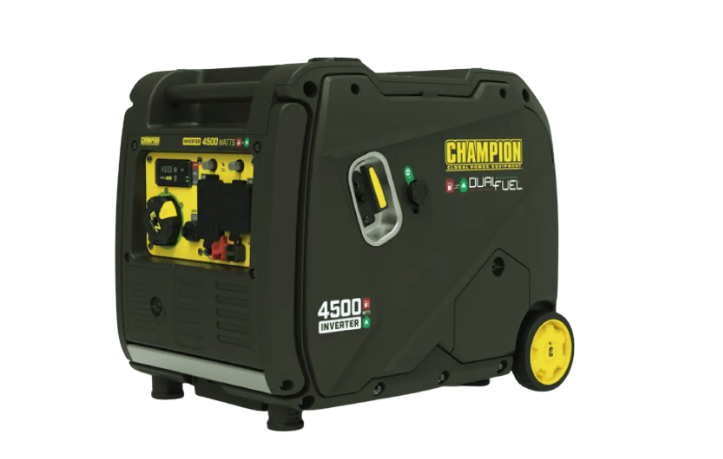
Starting a Champion Dual Fuel Generator is quite easy, but it is important to follow the correct steps to ensure it runs smoothly. Here is a basic overview of how to start it:
Check the Fuel Level: Before starting, make sure you have enough fuel – gasoline or propane.
Select Fuel Type: Use the fuel selector switch to select gasoline or propane.
Open the Fuel Valve: If you are using propane, make sure the valve on your propane tank is open.
Engage the Choke: If it is cold outside or the generator has not been used for a while, engage the choke to help it start more easily.
Turn the Key: Press the electric start button or use the recoil pull starter to start the engine.
Let it Warm Up: Give the generator a few minutes to warm up and stabilize.
After that, you’re ready to use your generator to do whatever you need it to do – whether it’s for your home, tools, or outdoor equipment.
Is the Champion Dual Fuel Generator any good?
Absolutely! Champion Dual Fuel Generators are known for their reliability and versatility. They offer a great value for money as they offer two power sources in one machine.
Many users find that the ease of switching between gasoline and propane makes them incredibly convenient in a variety of situations.
Champion is also a trusted brand in the generator world. They are well-known for making durable quality products.
Whether you’re running a few essential appliances during an outage or providing power for an outdoor event, the Champion Dual Fuel Generator consistently performs well.
Can a Champion Dual Fuel Generator Run on Natural Gas?
While many Champion Dual Fuel Generators run on gasoline and propane, most are not designed to run on natural gas straight out of the box.
However, you can purchase a natural gas conversion kit separately.
This kit allows you to convert your dual fuel generator to run on natural gas, which can be a convenient and cheaper option if you already have a natural gas line running to your home.
If you plan to run your Champion generator on natural gas, be sure to follow the instructions carefully to ensure a safe and smooth conversion.
Benefits of Using a Champion Dual Fuel Generator
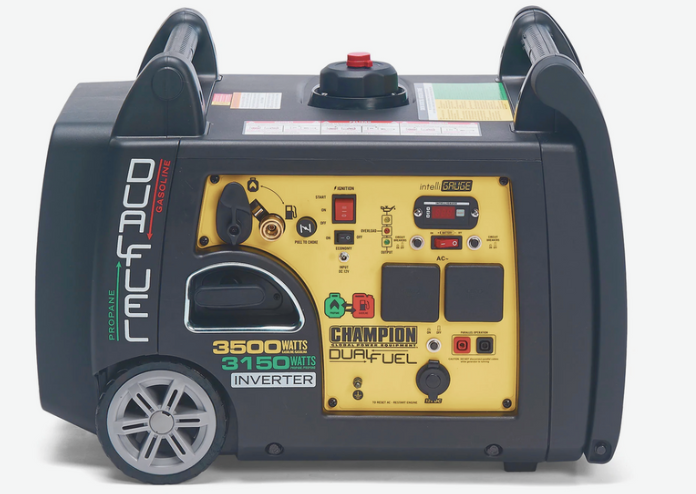
A Champion dual fuel generator offers several benefits that make it an attractive option for both emergency preparedness and outdoor activities.
One of its notable advantages is its versatility. With the ability to run on both gasoline and propane, you gain flexibility depending on the fuel available.
If you’ve ever faced a situation where you run out of gas during an emergency, you know how valuable this feature is. The convenience of simply switching to propane without having to stop or adjust anything is a game-changer.
Also, propane is known to be a cleaner-burning fuel than gasoline. If you’re concerned about the environment or simply want to reduce the amount of smoke your generator produces, propane is a great choice.
It burns more efficiently and produces fewer pollutants, making it a better option for long-term use, especially in enclosed areas or when you need to keep the air clean.
Another advantage is cost-effectiveness. Depending on fuel prices in your area, propane can be more economical than gasoline, especially in larger quantities.
You can take advantage of propane’s low prices and avoid the spike in gasoline prices. Plus, propane doesn’t spoil like gasoline, meaning it stores well for longer periods of time, making it a great choice for backup fuel in case of an emergency.
Common Problems with Champion Dual Fuel Generators and How to Fix Them
Like any appliance, your Champion dual fuel generator may experience some problems over time.
While these generators are designed to be reliable, understanding common problems and how to fix them can save you time and frustration.
Here are some common problems and simple solutions to keep your generator in top condition.
A common problem is the generator not starting. If your generator won’t start, the first thing to do is check the fuel. Make sure there is enough fuel in the tank, whether it’s gasoline or propane.
If the fuel level is correct, check to see if the fuel valve is open. If the engine still refuses to start, it could be due to a dirty or clogged carburetor.
Over time, dirt and debris can build up, preventing fuel from flowing properly. Cleaning the carburetor is often an easy fix, and you can do it yourself with a carburetor cleaning kit.
If the generator still won’t start after cleaning, check the spark plug for dirt or damage, as a faulty spark plug can prevent ignition.
Another problem that could occur is poor performance, where the generator may run but not produce enough power or has trouble handling the load. This can be caused by a variety of factors. A common cause is a dirty air filter.
When the air filter is clogged, it restricts airflow, causing the engine to work harder. Cleaning or replacing the air filter can resolve this issue and restore the generator’s efficiency.
Another possible cause could be old fuel, especially if you’ve been storing the generator for a while. Old fuel can lose its potency and affect engine performance.
If you suspect this, drain the old fuel and replace it with fresh gasoline or propane.
Power surges can also be a concern. If the generator is producing irregular power surges, it could be due to an overloaded circuit or a problem with the voltage regulator.
Check the load you are placing on the generator and make sure it is not exceeding its capacity.
If the generator is properly loaded and still experiencing surges, the voltage regulator may be faulty. In this case, you will likely need to replace the regulator to fix the problem.
Sometimes, the generator may shut down completely. If this happens, it may be related to an oil problem, especially if the oil level is very low or the oil is dirty.
Low oil levels can automatically shut down to prevent engine damage, while dirty oil can cause the engine to overheat. Regular oil checks and changes can prevent this problem.
If the oil looks fine, check the fuel lines and make sure they are not clogged or damaged, as limited fuel flow can cause the engine to shut down.
Finally, if you notice that your generator is making unusual noises, such as knocking or rattling, this could be a sign that something is wrong with the engine.
This could be a problem with the bearings or internal components. In this case, it is best to take your generator to a professional for a thorough inspection and repair.
How to Maintain Your Champion Dual Fuel Generator
Proper maintenance is essential to keeping your Champion Dual Fuel Generator running smoothly and efficiently for years to come.
Regular care will not only ensure that it will perform well when you need it most, but it will also extend its lifespan.
Fortunately, maintaining your generator doesn’t have to be difficult. By following a few simple steps, you can ensure that it is always ready to go.
First, check the oil regularly. Like any engine, your generator oil needs to be changed periodically. A good rule of thumb is to change it after the first 20 hours of use, then every 50 hours.
Be sure to use the oil recommended in your generator’s manual. Dirty or low oil can cause the engine to overheat, which can cause serious damage.
Always check the oil level before starting the generator to make sure it is up and clean.
Next, don’t forget about the air filter. The air filter prevents dirt and debris from entering the engine, so it is important to keep it clean. If the air filter becomes clogged, the engine will not run as efficiently, which can lead to overheating or poor performance.
Check the air filter regularly and clean it if it is not too dirty. If it is too dirty, replace it. This is a simple fix that can keep your generator running like new.
Another aspect of maintenance is checking the spark plugs. Over time, spark plugs can become worn or dirty, which can affect the generator’s performance.
Check the spark plug at least once a year. If you notice that it is dirty or damaged, clean it with a wire brush or replace it. A clean spark plug ensures that the engine is firing properly and achieving peak performance.
Fuel is another important factor to keep an eye on. For gasoline-powered generators, fuel can deteriorate over time, especially if it has been unused for a long time.
To prevent this, either use a fuel stabilizer or drain the fuel if you are storing the generator for an extended period of time. If you are using propane, make sure your propane tank is in good condition and the valve is working properly.
Finally, run the generator regularly. Even if you don’t need it for power, it’s a good idea to turn it on and run it for 20-30 minutes once a month to keep everything running smoothly.
This is a good way to prevent problems like old fuel or clogged components, and it ensures that the generator battery stays charged.
Conclusion: Should You Buy a Champion Dual Fuel Generator?
To sum up, the Champion Dual Fuel Generator is a top choice for anyone in need of reliable and versatile power.
It offers the convenience of running on both gasoline and propane, which is perfect for unpredictable situations like power outages or outdoor adventures.
The easy startup process, maintenance-friendly features, and overall durability make it a great investment for home and outdoor use.


